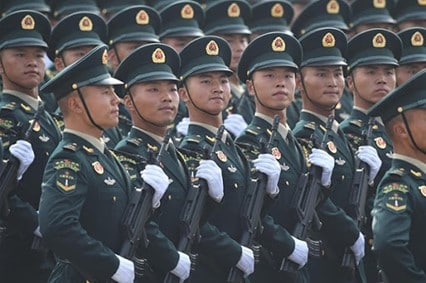On March 1, 2021, Secretary of Defense Lloyd J. Austin III held his first meeting with members of the Pentagon's new China Task Force. According to the U.S. Department of Defense website, the task force will finish its work in about four months, and "at the end, DoD officials want to provide Austin with specific and actionable recommendations and milestones to meet the China challenge."[1]
Two weeks later, on March 15, 2021, the Chinese media outlet Guancha.cn published an article by Chinese current affairs commentator Cheng Liang analyzing the strengths and weaknesses of the DoD's China Task Force (referred to in the article as the "China Strategy Working Group"). The article is intended as guide for CCP decision-makers so that they can assess the backgrounds, characters, knowledge, policy positions, and strengths and weaknesses of the members of the China Task Force.
Stressing that the composition of the China Task Force is "weak," the article added that China can use its own actions "to shape" the current U.S. government, especially since "the Biden foreign strategy has not taken shape." It concluded: "There is a strange circumstance: the Biden administration does not want to return the benefits reaped during Trump administration. It wants to collect other benefits that Trump administration gave up as well. The PLA [People's Liberation Army] should take advantage of the circumstance, use its own strong ability and power to suppress U.S. military capability…"
Below is the Guancha.cn article:[2]

(Source: Gov.cn)
'How Should We Treat The 'China Strategic Working Group' [China Task Force]?'
"Many people have not heard of the 'China Strategy Working Group' [China Task Force][3] According to the U.S. Department of Defense website, on March 1st, Secretary of Defense Lloyd Austin issued an action order to the 'China Strategy Working Group.'[4] The group was set up by President Biden. He ordered the group to start working immediately. The group is mandated to give a complete and detailed strategy report in four months.
"According to the Department of Defense spokesperson, the content of this report is expected to include a set of China's strategic posture analysis, existing strategic review, and follow-up recommendations for strategic action. The focus of the report is estimated to highlight practicality and operability and other elements. Due to its sensitivity, the report will not be published. It will be sent directly to President Biden's desk in July.
"How should we treat China Strategic Working Group? What might be their main research content? What 'important results' are estimated to be achieved? Where will the U.S. strategy toward China go next?
"Recently, I read many analytical articles giving importance and praise to the group in media. They pointed out that the specifications of this strategic group are 'unprecedented' and 'higher than the U.S.-Soviet fighting for hegemony period.' They hinted that the Sino-U.S. confrontation has further intensified, and even elevated to 'all-round total confrontation.' I do not agree with these opinions.
"The group is not 'unprecedented' in the U.S.-China political history. The group's specifications have not reached the level of preparation for 'full confrontation.'
"For instance, on May 7, 2020, a China Task Force was established. It was headed by Kevin McCarthy, the Republican leader of the U.S. House of Representatives.[5] The title of the Washington Post report about it was GOP to Launch China Task Force.[6] There is essentially no difference between that China Task Force and this China Strategic Working Group. The saying that the group is unprecedented is simply a one-sided and forgetful statement.
"Judging from the specifications of the group, it has not exceeded the China Task Force, either.
"The task force initiator was Kevin McCathy, leader of the Republican Party of the House of Representatives and an important political ally of President Trump. The leader of the group was Rep. Michael McCaul (R-Texas). The 15 members of the group were all Republican congressmen. In addition to strong support of President Trump, this group had attracted the attention of the Republican establishment leaders such as [Senator] Mitch McConnell. Because these 15 members come from multiple House Judiciary Committees [sic], their research topics cover the so-called threats from China's politics, economy, military, and even the epidemic. They had a fairly strong overall nature in the research topics. This was a real strong group for researching and analyzing superpower competition.
'Compared With The China Task Force Established By The House Republican Leaders, [The DOD's] China Group Has Quite A Few Shortcomings'
"Let's take a look at the specifications and organizational situation of the group. Although the group is established by Biden, its lead unit is placed in the Department of Defense. The real leader is the Secretary of Defense. The Chief of Military and Political Affairs is in charge. The group leader is Eli Ratner, Secretary of Defense Lloyd Austin's special assistant to China. The highest level of this person's political resume is when he served during the second term of the Obama administration as Biden's deputy national security adviser. He can be regarded as a 'China Master' in the Biden administration. According to reports from the U.S. media, the other 19 members of the team come from military services, the Joint Chiefs of Staff and the regional commands, the military intelligence system, Defense Intelligence Agency, CIA, and a senior researcher in a U.S. civilian think tank. Officials in the U.S. military and intelligence systems account for a large proportion of the group.
"Compared with the China task force established by the House Republican leaders, this China group has quite a few shortcomings in terms of specifications and organizational systems. The group team leader is just a middle-level official. The group's lead unit brand is not strong enough. After all, one is the Department of Defense and the other is the House of Representatives. The team leader's rank is also a bit low, which is not a problem for this group. The more critical questions for China are: what is the possible research direction of this group? What major content will be researched? What will be the possible research conclusions?
SUPPORT OUR WORK

'Giving These People The Task To Take A Broader And Higher Perspective… Exceeded Their Research Capabilities;' 'The U.S. Does Not Want To Extend The Overall China Strategy To The Level Of Superpower Competition'
"Many analyses conclude that the group's research may be 'cross-party,' 'cross-field,' and may even become the overall strategic layout, framework, and starting point of the U.S. government toward China in the next four to eight years.
"I disagree. Compared with the task force, the research of this group will not involve many fields or even create many cross-party, cross-fields research. Its main research direction on Chinese strategy will be specialized in the concerns of the Department of Defense.
"There may be two main reasons. First, the composition of the group is weak. There are two confirmed researchers from private think tanks – Melanie Hart, senior researcher at the Center for American Progress and Elizabeth Rosenberg, former senior adviser to the Ministry of the Treasury and senior researcher at the Center for a New American Security.
"Of these two think tanks, only the Center for American Progress' daily research focuses on soft power games. The Center for New American Security is one of the core private think tanks on U.S. national security strategy, including military strategy. This undoubtedly means that this 'China Strategy Working Group' is actually filled with a group of siloviki or nongovernmental figures with a silovik background. Giving these people the task to take a broader and higher perspective from the overall warfare level to examine the Sino-U.S. major power competition relationship exceeded their research capabilities. The relationship was jointly shaped and formed by political, economic, technological, military, ideological and other fields. Even if they try hard beyond their capabilities, such a group of people cannot complete the task in four months.
"Referencing the report on the Department of Defense website, we can figure out what the group is trying to do. The main function of this group is: 'Countering Chinese efforts is the focus of the task force.' This is of course a cliché.
"Defense officials called the group activities a 'sprint effort.' It will examine high-priority topics including strategy, operational concepts, technology, force structure, force management, and intelligence. The group will also examine U.S. alliances and partnerships and their impact on Sino-American relations and DOD relations with China.
"The priority research topics of this group include strategy and operational concepts (possibly focusing on the strategic level), tactics and force building (focusing on the tactical level), the current strategic situation of the military, military administration and intelligence information collection (focusing on situational research and judgment). The group will also focus on studying whether these contents meet the needs of 'opposing China's efforts.' Minor research contents include 'the relationship between the United States and the alliance, the relationship between China and the United States, and the relationship between the two defense departments.' These research contents, especially ones with high priority, should be included in the military strategy research category.
"At the same time, Biden is advancing an overall strategic assessment plan for the reorganization of the U.S. military's global presence and strategic priorities, the so-called global strategic posture assessment. The core task of that team is to evaluate the U.S. military strategy against China, the U.S. military's war plan and strategic posture against China, possible battle layouts, the research and development of new weapons and equipment for the U.S. military. From the military and national security level, the United States evaluates the possibility of dealing with China and finds ways to contain the Chinese People's Liberation Army's naval and air forces. The PLA is gradually occupying a strategic position in the Western Pacific Ocean. I believe the U.S. does not want to extend the overall China strategy to the level of superpower competition.
"Of course, military strategy, as a major part of the United States' China strategy and competition among major powers, is also shaping the appearance of the United States' China strategy to a large extent. The comparison of China and U.S. military power will also have an impact on the overall strategic situation between China and the United States. We must accept this fact.
'The Few Strategic Statements [Biden] Made About China Basically Continued The Argument Of The Obama Administration;' Defense Secretary Austin 'May Not Understand… The Strength Of The PLA'
"Now we have clarified the specifications and tasks of this group. Let's guess what kind of report these twenty-odd individuals can come up with in four months. This is probably the topic that everyone is most concerned about.
"We really have no way to make accurate predictions about what others have not studied, researched, concluded, or written. We can use the attitude of the U.S. government and the important members of this group towards China in the past. Attitudes and the current strength comparison between the Chinese and American armed forces, roughly predict how the group will issue its report in four months.
"The basic attitude of the current administration towards China is a good indicator. We mainly need to look at two people, U.S. president and group initiator Biden, and Secretary of Defense Austin who sets directions for the group.
"Since Biden took office, the few strategic statements he made about China basically continued the argument of the Obama administration. China strategically constitutes a competitive relationship with the United States. It is not the same as the relationship between U.S. and U.S.S.R. during the Cold War. The United States should contain China on some key issues, but selectively show an attitude of cooperation on minor issues.
"Biden's strategic thinking on China is essentially a simple repetition of U.S. engagement and containment strategy against China over the years. To ensure continuity with the Trump administration's policy emphasizing the importance of containment. However, this does not mean that the current U.S. government's relationship with China will be worse than the previous President Trump administration. The relationship between the two countries remains stable on the whole and confrontation in certain areas will be the mainstream.
"Secretary of Defense Lloyd Austin succeeded General Odierno as the commander-in-chief of the U.S. Army in Iraq in September 2010. He served as the Deputy Chief of Staff of the Army in January 2012. He became the commander of the U.S. Central Command in March 2013 and thus became the highest commander of the U.S. military in the Middle East and Central Asia. In 2016, he retired from active service in the U.S. Army as a four-star general. Throughout his service experience, he was deeply involved in the battle sequence of the U.S. Central Command. His main combat opponents and imaginary enemies include Taliban in Afghanistan, Iraqi government forces [sic], Syrian Arab army [sic], Iranian army and the Iranian Islamic Revolutionary Guard Corps, and the Russian Air and Space Force and mission aviation brigade in Syria. He may not understand the strategic situation in East Asia and the Indo-Pacific region, nor the strength of the PLA.
"The attitudes of two people will have a critical impact on Secretary of Defense Austin's perception of China. The first person is his boss, Biden. Austin has to have a high degree of political consensus with him. The second person is Ratner, his assistant for China affairs and the leader of the group.
Group Leader 'Ratner's Strategic Attitude Toward China Is A Weakened Version Of Trump's And A Strengthened Version Of Biden's'
"Other group members' attitude towards China will influence Austin's to lesser degrees. Ratner's strategic attitude toward China is a weakened version of Trump's and a strengthened version of Biden's.
"On the one hand, Ratner recognizes China's attitude towards the United States in East Asia and the destruction of the geopolitical situation in the Far East. He advocates comprehensive Indo-Pacific strategy to launch strategic competition with China and to reshape U.S. influence in this region. On the other hand, Ratner disagrees with complete decoupling from China. He believes that forced decoupling from China is damaging to the U.S.'s influence and may cause damage to the U.S. economy. The correct strategy for China should proceed based on the so-called 'adjustment and reshaping' principle.
"If this principle and cognition can run through the work of the group, then it is foreseeable that this report will likely be a repetition and reinforcement of Ratner's original views. The assumption is that they are not affected by the ultra-anti-China factions in the U.S. military system and the U.S. intelligence system. Ratner will likely return to the strategic layout of Asia-Pacific military rebalancing plan of the Obama administration.
"Austin, influenced by Ratner's views, and staying consistent with Biden, may re-launch the U.S. military's strategic deployment in East Asia based on the Asia-Pacific rebalancing routine. This means that the U.S. military strategy and mode of action against China in the next three or four years may be similar to those of the U.S. military from 2013 to 2016.
"Some actions, such as the development of new land-based and sea-based hypersonic ballistic missiles, the development of new destroyer projects, and strategic linkages with some countries around China will be more urgent and oppressive than in previous years. Correspondingly, the actions of some countries around China will also be more radical and unpredictable. This is most worthy of our attention.
'The Biden Administration Does Not Want To Return The Benefits Reaped During Trump Administration'
"For China, we can use our own actions to shape the current U.S. government, especially since the Biden foreign strategy has not taken shape. There is a strange circumstance: the Biden administration does not want to return the benefits reaped during Trump administration. It wants to collect other benefits that Trump administration gave up as well.
"The PLA should take advantage of the circumstance, use its own strong ability and power to suppress U.S. military capability in the first and even the second island chains.
"This way, China can not only make the group recognize the real Sino-U.S. power balance and avoid misjudgments in basic situation assessment, but also prompt the Biden administration to abandon unrealistic illusions as soon as possible. China can prompt Sino-U.S. relations to turn to our advantage.
"In short, as a long-term relationship between major powers that coexist with struggle and cooperation, Sino-U.S. relationships deserve our long-term attention."
[1] Defense.gov/Explore/News/Article/Article/2519254/china-task-force-begins-work-dod-makes-progress-on-covid-19, March 1, 2021.
[2] Guancha.cn/chengliang/2021_03_15_584075_s.shtml, March 15, 2021.
[3] Defense.gov/Explore/News/Article/Article/2519254/china-task-force-begins-work-dod-makes-progress-on-covid-19, March 1, 2021.
[4] Defense.gov/Explore/News/Article/Article/2519254/china-task-force-begins-work-dod-makes-progress-on-covid-19, March 1, 2021.
[5] Thehill.com/homenews/house/496587-mccarthy-unveils-new-gop-led-china-task-force, May 7, 2020.
[6] Washingtonpost.com/opinions/2020/05/07/gop-launch-china-task-force-that-democrats-bailed, May 7, 2020.




